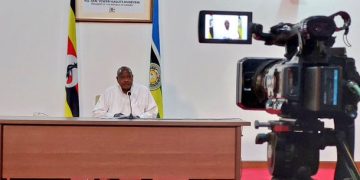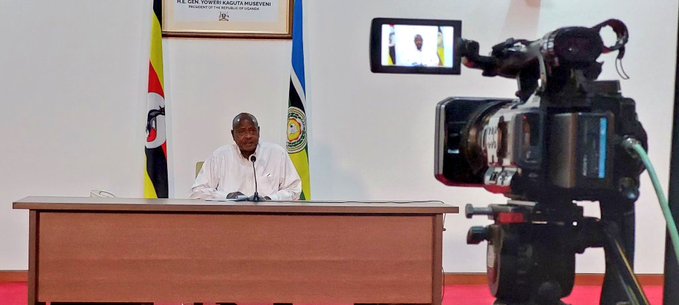President Museveni has said subsidies for and removing taxes from imported products is definite suicide.
“It will deplete both family savings and National Reserves, leading to the inability to pay for imports,” Museveni said Sunday night while addressing the nation on the state of the economy.
He said this was because foreigners beyond East Africa do not accept the shilling as a unit of exchange.
“Of course, the problem of high commodity prices is much easier to deal with and it is not new,” he said.
He said at the beginning of the NRM Administration in 1986 and for the period 1972-1986, following the expulsion of the Ugandan-Indian entrepreneurs by Idi Amin, Uganda experienced continuous high inflation, severe shortages of commodities (so called “essential commodities”), very high prices, forex black market (Kibaanda), smuggling of goods out and into Uganda (magendo) and speculation (kusamula).
“Therefore, the recent phenomenon of high commodity prices, is, indeed, a problem but it is easier to solve than, for instance, Covid-19 was. Covid-19 needed severe restrictions and new science (eg. Vaccines). This one will be solved with existing knowledge but rightly applied.”
Factors behind high commodities prices:
According to Museveni, the end of covid-19 pandemic, meant that sectors of the economy that had been closed, such as hotels, suddenly opened when the production of, for instance, palm oil for soap manufacture had also declined because there had been no demand for two years.
The resumed production levels cannot yet match the demand.
“I also hear, that some of the producers decided to turn their palm oil into petrol, just like we were about to turn our surplus sugar into petrol as a way of solving the problem of kyengera (surplus),” he said.
“The war in Ukraine and Western sanctions on Russia, have also caused shortages of wheat for the bread-eaters that do not include me because I am a muhogo-karo-banana eater and milk drinker, fertilizers, petrol, gas, etc.”
He said currently, Uganda has to confront the struggle between the two lines: the revolutionary, patriotic line of the truth and seriousness on the one hand and the reactionary line of populism, cheap popularity and lack of realism of: prices-control by Government, subsidies, tax cuts on the other hand.
“It is a choice between okubandama (collapse) of the economy on the one hand or survival (kwetaasa, kuhonoka). The real medicine for high prices and shortages, is increased production. Produce more, if you can.”
He said the problem of high commodity prices of: petrol, diesel, sugar, salt, bar soap, powder soap, cooking oil etc., is not as dangerous as covid-19.
“However, if it is not handled correctly, it can lead to collapse. Yet, with patience and correct response, it will turn out to be an advantage for the country.”
He said some of the ideas people think about when confronted with high commodity prices, are the idea of subsidy (Government okutu kwatirako) or removal of taxes by Government from those commodities, he pointed out.
“With imported commodities, this is a recipe for disaster. It will lead to collapse. Why? Let us take the example of petrol. A litre of petrol before the rise of prices in November 2021, was Ugx. 4,590 which meant USD 1.3 at that time. A litre of petrol is now Ugx. 5,500 which means USD 1.48. This is all with the tax. The more expensive litre of petrol (ey’obuseere), is doing two bad things: emptying the pockets of the consumers, but also emptying our national dollar reserves. We now have USD 4.5 billion in our Reserves.”
“These are enough to support imports for 4.2 months. If we subsidize or even just remove the taxes on imported commodities, the level of consumption will either remain the same, but this time each litre taking more dollars, or actually increase,” he added.
He said the dollar drain will now increase per litre and also, worse, people may buy more of this expensive commodity and this would seriously encroach on the reserves.
“Moreover, the removal of taxes on some of the commodities, would mean tax loss to Government of: Ugx. 1.53 trillion for petroleum, Ugx. 1.15 trillion for diesel, Ugx. 520 billion for wheat. How, then, do we fund our budget for – roads, electricity, schools, medicine, security, etc.? There are items we do not tax – eg. Medicine, raw materials, etc. It is, therefore, not true that we tax everything. The very crucial items, are not taxed. Therefore, removing taxes or subsidizing many of the imports is suicidal and a blunder.”









